EXCLUSIVEBombshell crime scene photos that cast doubt on whether whistleblower committed suicide
- GRAPHIC CONTENT WARNING
- Got a story? Email [email protected]
Just 40 minutes after police broke down Suchir Balaji's door and found him lying on the floor of his apartment, they declared his death a suicide.
The tech prodigy, 26, who just a month earlier blew the whistle on OpenAI's dubious methods of training ChatGPT, shot himself in the head. Case closed.
But when his parents Poornima Ramarao and Balaji Ramamurthy stepped inside his home after his body was carted off to the morgue, the scene didn't make any sense.
Photos obtained by DailyMail.com show blood was pooled next to the bathroom door where his head lay, but also splattered around the bathroom far from the body.
Lying on the bloodstains were one of Balaji's wireless earbuds and two mysterious tufts of what appeared to be synthetic hair, like from a wig.
His home, in a high-end building on Buchanan Street in San Francisco's Mint Hill neighborhood, was also ransacked, 'like someone was searching for something'.
'After seeing there is so much blood everywhere, I don't know how they think it's a suicide, it doesn't look close,' his father, Ramamurthy, told DailyMail.com.
Balaji's parents refuse to believe their son took his own life, insisting it was a 'cold-blooded murder' despite police declaring there was no foul play.
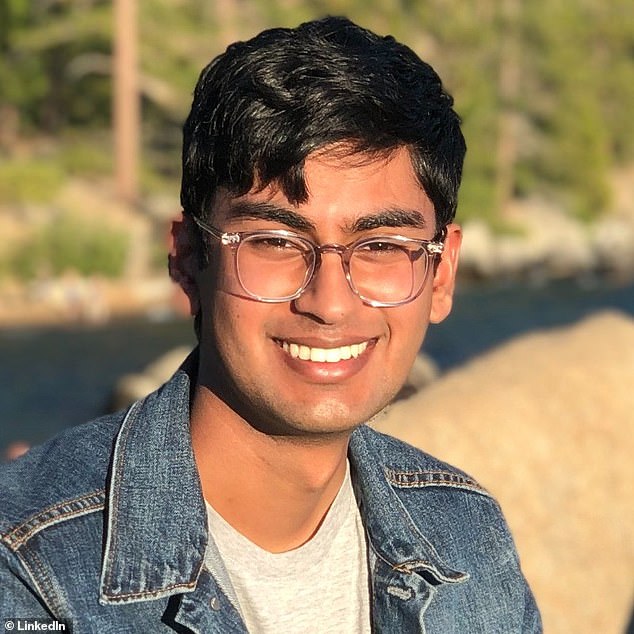
Suchir Balaji, 26, was found in his apartment in San Francisco on November 26 with a gunshot to the head and his death ruled a suicide
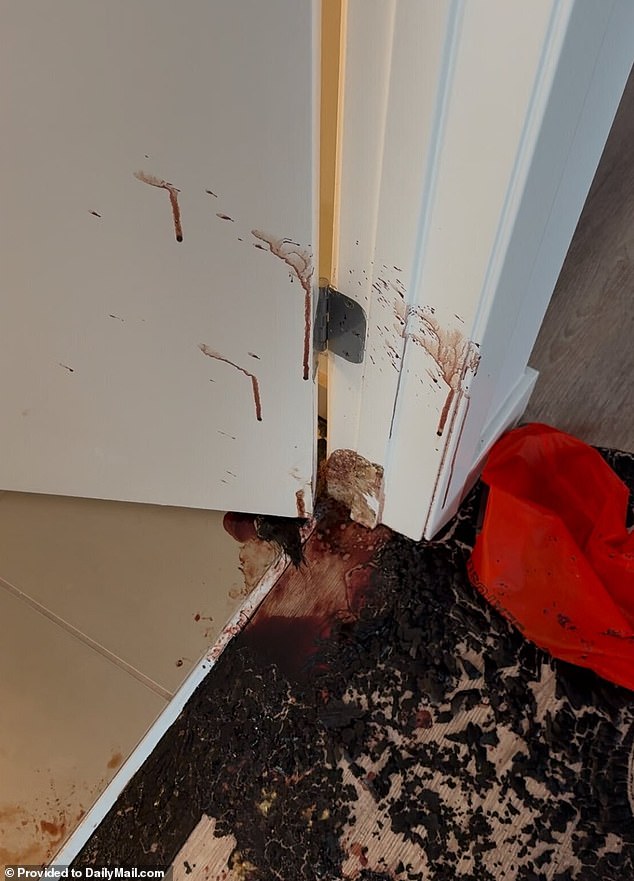
Photos obtained by DailyMail.com show blood was pooled next to the bathroom door where his head lay, but also splattered around the bathroom far from the body
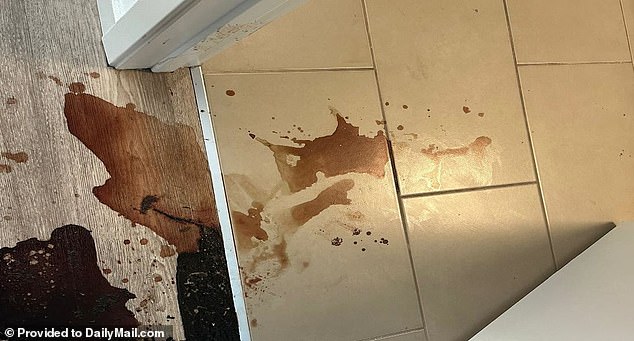
Blood both inside the bathroom, and pooled on the floor outside the door where his head was found
His apartment sits frozen in time - never cleaned, and touched as little as possible since police left it on November 26.
Neither have they held a proper funeral nor buried his body, instead raising $85,000 to pay lawyers, investigators, and forensic experts to prove he was murdered.
One of them was Professor Dinesh Rao, who wrote a preliminary report on the scene obtained by DailyMail.com.
The report includes dozens of photos showing the condition of Balaji's one-bedroom apartment, along with earlier images taken by his family.
The bachelor pad is relatively orderly through the entrance and lounge area, but rapidly changes as you get closer to where he died.
His last meal, a half-eaten ready-meal with brown rice still in the plastic tray, sits on his cluttered desk with a fork and a restaurant receipt.
Worse still is the kitchen table, strewn with clutter, some of which spilled onto the floor along with pieces of chocolate.
'The disturbed surroundings supports possibility of fights/resistance, which need to be corroborated with other forensic evidence,' Rao wrote.
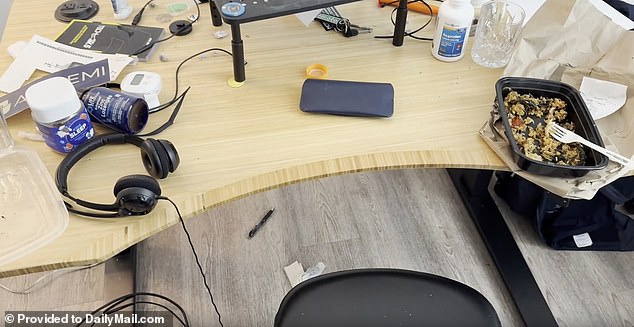
His last meal, a half-eaten ready-meal with brown rice still in the plastic tray, sits on his cluttered desk with a fork and a restaurant receipt
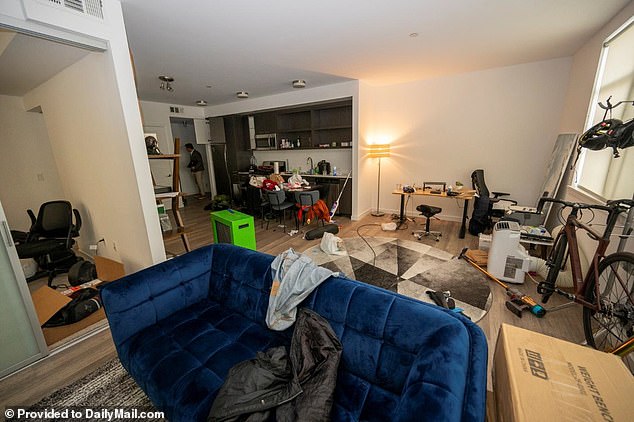
His apartment sits frozen in time - never cleaned, and touched as little as possible since police left it on November 26
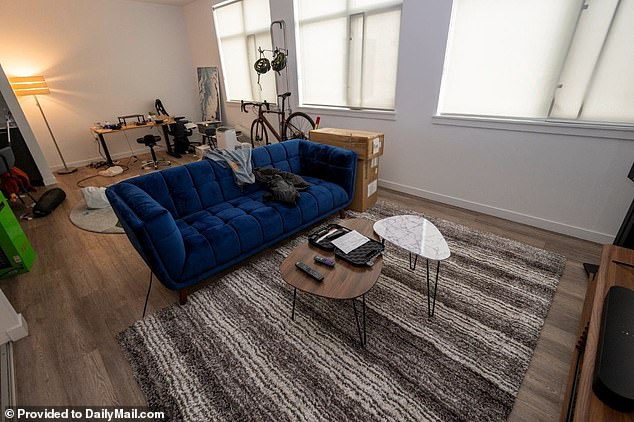
The bachelor pad is relatively orderly through the entrance and lounge area, but rapidly changes as you get closer to where he died
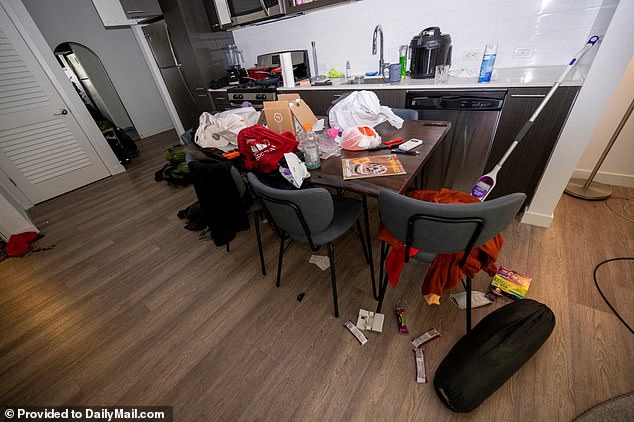
The kitchen table, strewn with clutter, some of which spilled onto the floor along with pieces of chocolate
Balaji's bedroom was also in upheaval, and a wireless earbud was found on the floor near the entrance, with blood stains and hair strands on it.
Close by, just outside the bathroom door near the hinges, was a large area of dried blood with the other earbud and a red shopping bag.
Splattered blood extended up the door and the doorframe about 18 inches, dripping down to the floor, and a splash extended just past the threshold on the bathroom tiles.
One tuft of synthetic hair was jammed in the corner of the door, and other, including a pin, so coated with dried blood it blended into the pool.
The hair has only been physically examined and will soon undergo lab tests, along with blood samples, to find out what it is made of and if there was anyone else's DNA at the scene.
Inside the bathroom were drops of blood across the tiles, on the cabinet next to the sink, and on the cabinet handle, on the other side of the room.
Rao wrote that some of the drops of blood appeared to have fallen while the victim was sitting, or possibly crawling, and others while standing. Some of the blood could have been coughed up.
Also on the floor was a knocked over trash bin and a plastic floss pick.
Ramarao said she had not seen photos of her son's body at the scene, but police told her he was found lying on his back with his feet pointed away from the bathroom.
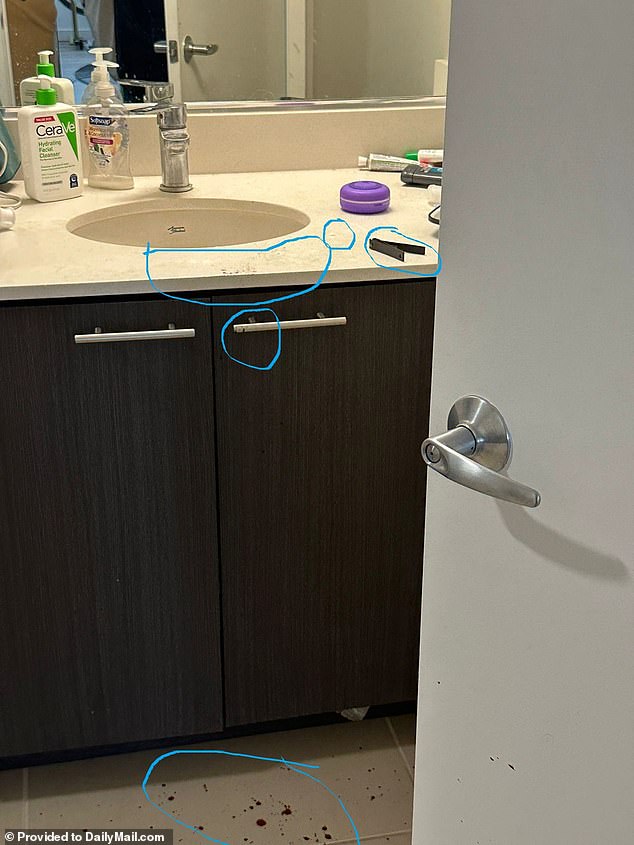
Inside the bathroom were drops of blood across the tiles, on the cabinet next to the sink, and on the cabinet handle, on the other side of the room
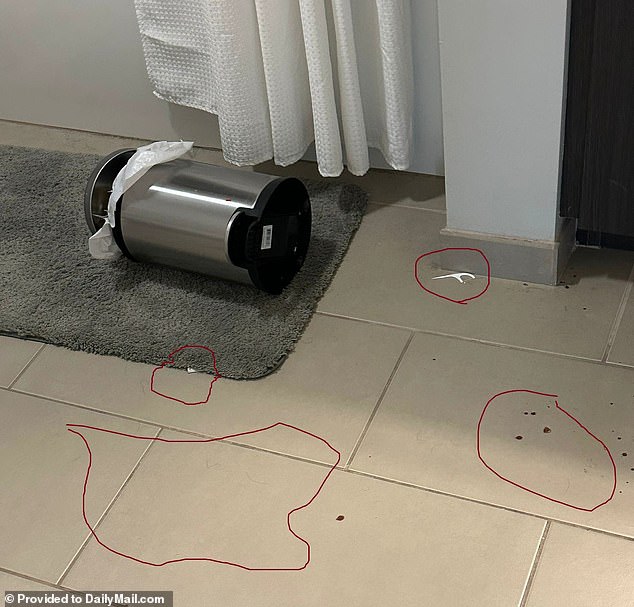
Also on the floor was a knocked over trash bin and a plastic floss pick

The stock layout of Balaji's apartment with the bathroom where he was found on the left
She also said the private autopsy she paid for showed the bullet was shot from above, entering above his nose and lodging just below the back of his skull.
She claimed the bullet completely missed his brain, and he instead bled to death on the bathroom door, and had a second blunt trauma wound on the side of his head.
Rao wrote in his report that Balaji likely bled for 15 to 30 minutes.
Balaji's parents theorize their son was attacked from behind while he was listening to music and cleaning his teeth, and his head smashed into the wall or cabinet.
After fighting back, he was pulled up onto his knees or sitting down, and shot in the head. As the wound wasn't fatal, he survived for some minutes and got out of the bathroom before dying from blood loss.
'A 10-minute struggle, probably,' his father said.
His parents believe the apartment was ransacked because the killer was looking for a storage device that had damning evidence on it.
Balaji's gun, a Glock pistol that records showed he bought on January 4, 2024, was found near his body, along with a box of 9mm ammunition in his closet with six rounds missing.
One of the rounds was found in the gun case, which included the record of sale, another four elsewhere, and one unaccounted for.
Ballistic tests to confirm whether this was the gun that killed him are yet to be carried out. His parents claimed there was no gunshot residue on his hands.
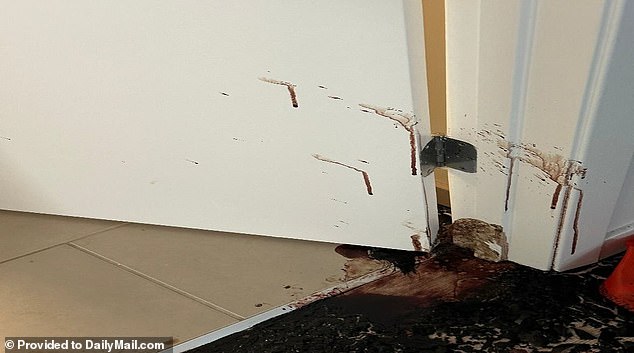
Splattered blood extended up the door and the doorframe about 18 inches, dripping down to the floor, and a splash extended just past the threshold on the bathroom tiles
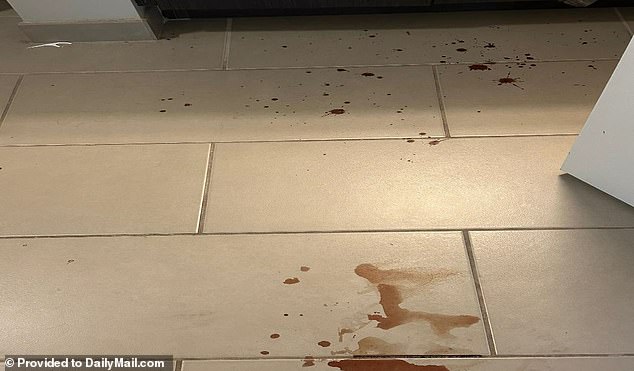
Blood drops inside the bathroom looking inside from the door
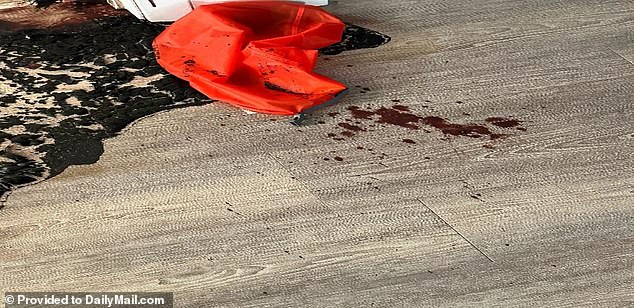
A splash of lighter blood next to a red shopping bag that was stuck to the biggest blood pool
Rao criticized the police investigation as 'incomplete and inadequate' that missed vital clues like the fake hair and earbuds, which he called 'a very serious error'.
'Will have a serious impact on the understanding of the manner of death, besides helping the alleged suspect (if any) to escape from the crime and adding more speculations surrounding the death,' he wrote.
Rao wrote that the disturbed scenes were 'more likely seen in homicidal death scene and rarely observed in alleged suicidal cases'.
He also noted the lack of a suicide note and the 'widely distributed and pattern of blood splatters' were 'most unlikely in victims whose fatality/unconsciousness is instantaneous' as in a suicide by gunshot.
Ramamurthy said his son's apartment was never completely tidy, but it was never anywhere near as messy as they found it.
'Everything is scattered, like somebody is searching something,' he said.
'And the blood spots all over the place, hairs… if they have taken a deep analysis, they could have seen this, but they didn't want to, they just took the gun and took him, that's all.
'They already decided it was a suicide when they walked in, in 40 minutes, then they handed us back the keys.'
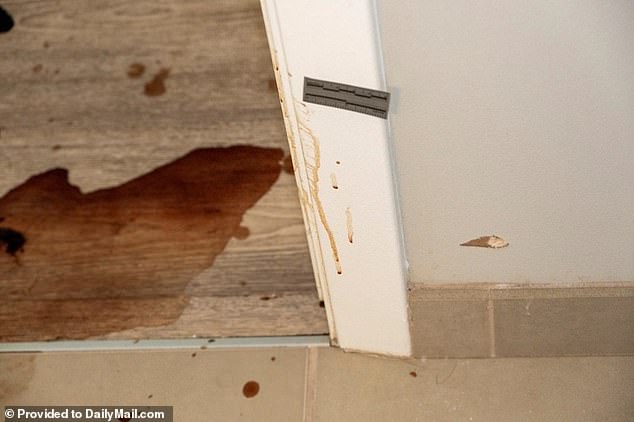
Blood on the other side of the doorframe to the vast majority of the blood splatter, as seen from inside the bathroom
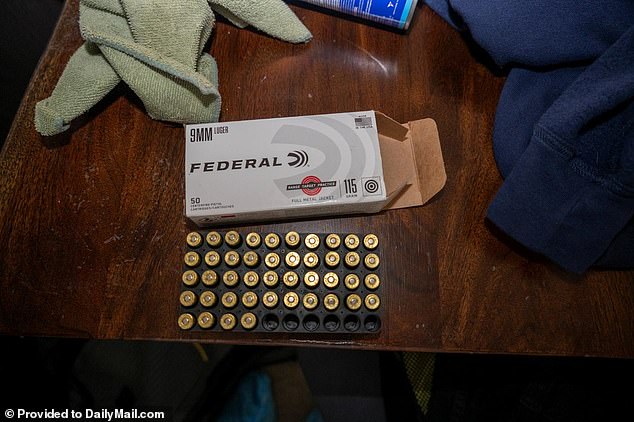
Balaji's gun, a Glock pistol that records show he bought on January 4, 2024, was found near his body, along with a box of 9mm ammunition in his closet with six rounds missing
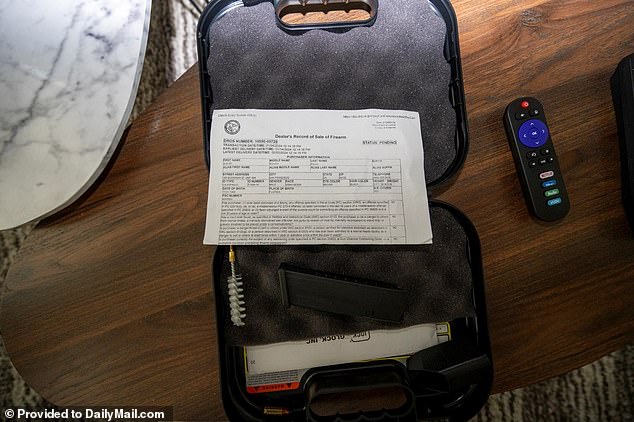
One of the rounds was found in the gun case, which included the record of sale, another four elsewhere, and one unaccounted for
Balaji's last hours alive
Ramamurthy was the last known person to speak to Balaji, in a phone call at 7.12pm on November 22 that may only have been hours before he died.
Balaji had just returned from a holiday to Los Angeles with some friends, who were former colleagues or worked in tech, for his birthday a day earlier.
They spoke for 15 minutes about his trip, the hikes he did in LA, the weather, and the birthday money Balaji would soon be sent.
Ramamurthy asked him if he wanted to go to an exhibit in January together, and he said, 'Sure, let's see, I'll think about it'.
'I asked do you plan to visit us and he said, "Not immediately",' he recalled.
'He was happy, he didn't show any depression. He had just returned, and in the end he said, 'I'm going for dinner, I'll talk to you later.' Usually, he goes out for dinner.'
Whether the half-eaten ready-meal meant he never went out, just got takeaway, or ate it the next day is unclear as the exact time of death is not known - though police believe it to be that night or the next morning.
Balaji's parents didn't hear from him for the next two days - the weekend - but weren't concerned as he was often busy and had just returned home.
But by Monday, they began to worry; it wasn't like him not to answer their calls at all.
'We called all the hospitals because sometimes he rides his bike and in San Francisco sometimes there are crazy drivers, so we thought something happened, an accident or something,' Ramamurthy said.
'He wasn't there so we thought he must have gone to a friend's place or hiking.'
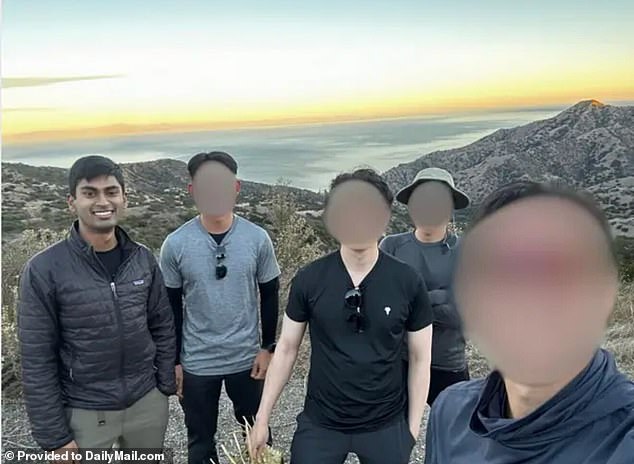
Balaji had just returned from a holiday to Los Angeles with some friends, who were former colleagues or worked in tech, for his birthday a day earlier
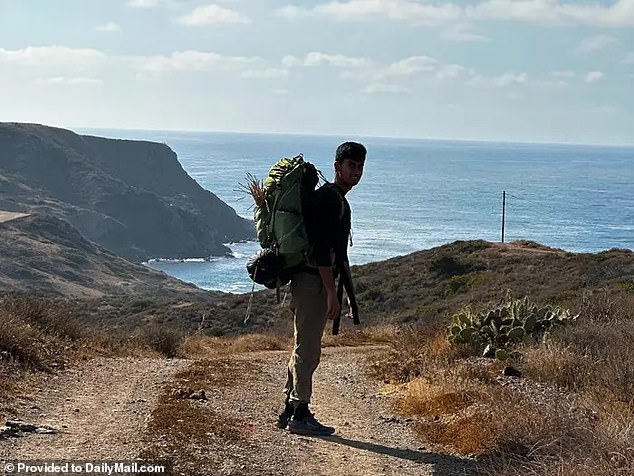
Balaji hiking near Los Angeles during the holiday just before he died
They reported him missing first thing on Tuesday, and police forced open his door about 1pm for a welfare check. That's when they found his body.
Ramarao arrived soon after, and claimed police refused for hours to tell her if her son was dead. At 2pm they told her to go home, but she refused.
Finally, at 3.20pm, she saw a white van arrive outside and only a stretcher emerge. Staff inside were from the medical examiner, and told her a body was in Balaji's apartment.
Ramamurthy said the couple wrestled for days with the being told their son took his own life, until a phone call from the Associated Press changed everything.
Tech prodigy to whistleblower
Balaji never expected to become a lightning rod for those wary of the emerging power of artificial intelligence - or just his boss, OpenAI founder Sam Altman.
He joined the company in November 2020, having spent four months interning there two years earlier while studying at UC Berkley.
Ramarao was always convinced her son was special, from speaking complex sentences at two to building a computer at 13 as he grew up in Cupertino, California.
'He was a prodigy. We knew he had excellent motor skills when he was two and a half months,' she said at a vigil the day after his body was found.
'At 13 months old, he showed he was not ordinary by picking up all the alphabet. Less than two years old, he could recognize words.'
His senior year of high school in 2016 he won a platinum division of the USA Computing Olympiad, a programming competition, and was recruited to work for Quora as a software engineer.
Then in 2018, while a student at Berkley, he won $100,000 by placing seventh in a competition to write an algorithm to improve TSA passenger screening.
Balaji's work at OpenAI also impressed, to the extent where co-founder John Schulman lionized him on LinkedIn.
'He'd think through the details of things carefully and rigorously. And he also had a slight contrarian streak that made him allergic to "groupthink" and eager to find where the consensus was wrong,' he wrote.
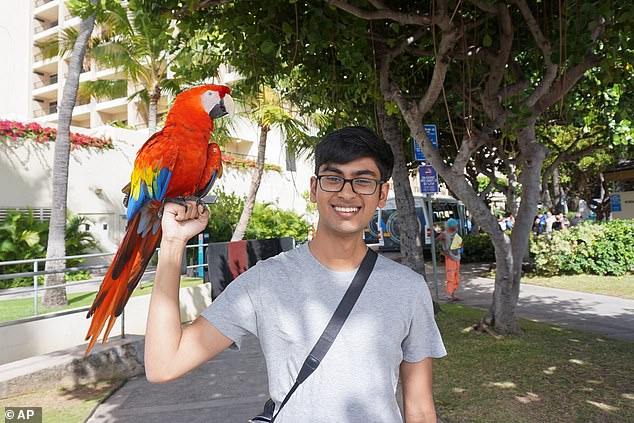
Balaji never expected to become a lightning rod for those wary of the emerging power of artificial intelligence

Balaji lived in this high-end building on Buchanan Street in San Francisco's Mint Hill neighborhood
But as early as 2022 he was starting to question the work he was doing, training GPT-4 - the engine behind ChatGPT - with reams of data from the internet.
Balaji had justified his work by treating it like a research project, but after it was launched in late 2022 and sold commercially, he began to rethink this.
He came to the conclusion that OpenAI was so grossly violating copyright laws that not only was it illegal, it was unsustainable for the internet itself.
Eventually he quit last August and wrote his findings in a detailed essay on his personal website, then spoke to the New York Times.
Balaji's NYT interview was published on October 23, shocking his parents and even his friends - none of whom he told in advance.
Ramarao berated him for speaking out by himself instead of joining forces with other whistleblowers, and for posing for photos so everyone knew what he looked like.
'I was very concerned because he might be called a whistleblower that might impact his career, that was my biggest fear,' she said.
'But never that his life would be in danger.'
Balaji told her not to worry – he wasn't giving away confidential secrets, just expressing his opinion on the work, and he had enough money from his OpenAI stock.
'He said he wasn't looking for another job, he said he was planning to found a startup,' his mother said.

Balaji's parents Poornima Ramarao and Balaji Ramamurthy (pictured with him) insist he was murdered and have spent more than $100,000 trying to prove it
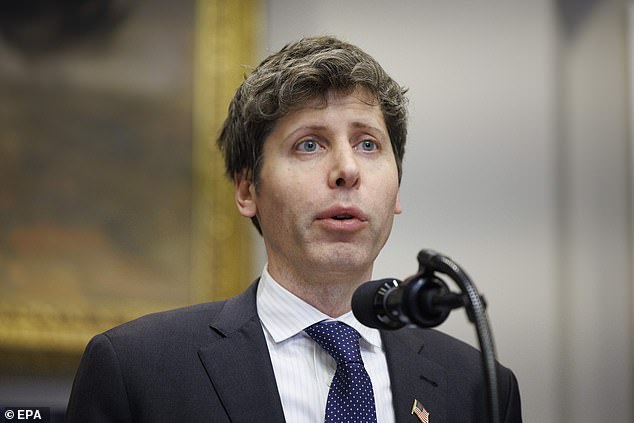
Balaji worked for OpenAI founder Sam Altman until last August, when he quit and and wrote his findings in a detailed essay on his personal website, then spoke to the New York Times
Then a week before his death, the NYT named him as a 'custodian witness' in its copyright infringement lawsuit against OpenAI and Microsoft.
His mother believes that implied he had more damaging information up his sleeve, and was targeted for it.
Balaji wasn't done going public, either. Days after his death, his phone rang and his parents picked it up.
On the other end was an Associated Press reporter who didn't know Balaji was dead, and was calling to schedule an interview he agreed to do.
'Maybe he had some new information to share with AP and somebody doesn't want that liability, so they targeted him,' Ramamurthy said.
'After that phone call we got suspicious. We were just finding so many things suddenly happened and it was kind of frozen for us what to do next.
'So then we got this call, then we thought, oh, this is something totally big, this has to be investigated.'
Worried, but not suicidal
Balaji's parents have three main reasons they believe he couldn't have killed himself - the crime scene, the timing of his death after going public, and that he had too much to life for.
'There's no depression, he didn't have a suicide note or anything, he was financially stable, he has a good friends circle, going around having a good time,' his father said.
'If I'm depressed usually I'm isolated watching movies and drinking – but he didn't do that.'
'The way I talked to him that night, he didn't show any stress, he was very cool and normal and there was no strain in his voice.
'He takes care of himself, he goes to the gym, he's health-conscious, he goes with friends to so many movies – he's not a person to get depressed, he's outgoing, he had plans for his own startup.
'He had some members already collected from Berkley, he had a lot of future plans.'
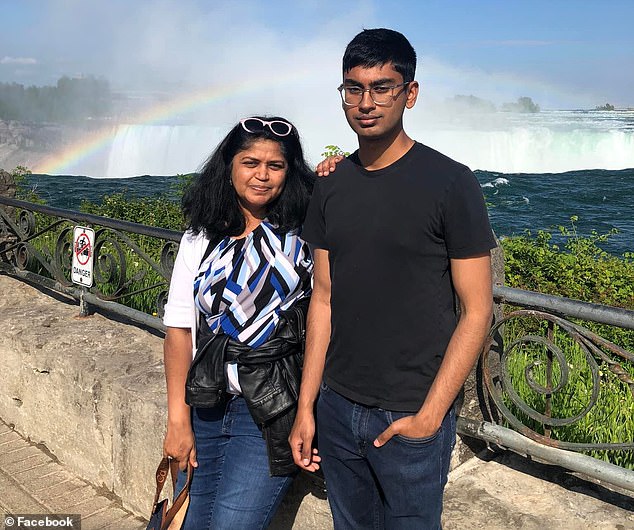
Ramarao berated him for speaking out by himself instead of joining forces with other whistleblowers, and for posing for photos so everyone knew what he looked like
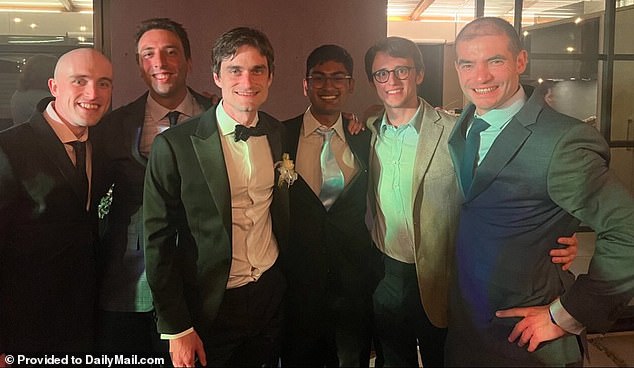
Balaji (center) with friends. His parents said he had a very active social life
Though his parents are adamant Balaji wasn't depressed or suicidal, he wasn't quite himself - he seemed worried, off-balance, even afraid.
Ramamurthy said he thought Balaji was planning to do more press interviews as a means of protecting himself 'and also expose things'.
He also speculated whoever killed Balaji gave him a warning and that's why he bought a gun 10 months before his death.
'He didn't care – he's a little bit more like his mother than me, I'm very cautious,' he said.
'He bought a gun in January, that's a long time back, one year, so we assume he has had some threat somewhere, you want to protect himself from that.'
Ramarao said he also months earlier discussed with his former boss about leaving OpenAI and studying a PhD instead.
'Usually he'll be very focused on his work, so there was something going on… [we may never know] unless we get access to his laptop and other things or the HR record or something, since he's very secretive,' she said.
Balaji 'hated' his boss
Another wrinkle was added to the story when Sam Altman's sister Ann Altman, 30, claimed he molested her when she was a child.
The disturbing lawsuit filed earlier this month in the US District Court of Missouri - where the siblings grew up - alleged the abuse was between 1997 - when Ann was just three years old and Sam was 12 - and 2006.
It claimed Altman 'groomed and manipulated [her] into believing the aforementioned sexual acts were her idea, despite the fact she was under the age of five years old when the sexual abuse began and [he] was nearly a teenager'.
Altman and his family took the unusual step of publicly rebutting the 'deeply hurtful and entirely untrue claims'.
They said Annie 'faces mental health challenges' and despite financial assistance and offers of help, kept asking for money and making damaging claims about her family.

Sam Altman (pictured left) denied claims by his sister Ann (pictured center-left) in a new lawsuit that he sexually abused her as a child
Ramarao said she had no opinion on the lawsuit, calling it 'between the two of them'.
'There are things that we know that we can speak for there are things that we don't know that we cannot speak for, right?' she said.
But she said though Balaji never spoke to his parents about Altman, friends have since his death revealed the contempt he held his boss in.
'He's a very weird person… Suchir hated him, that much I can tell you. All his friends say he was very vocal against Sam Altman,' she said.
'He never hated anyone in his life in his life. I've never heard him complain in the school days or college days or even coworkers. He never said anything negative about anyone, so he probably had strong reasons for that.'
Parents search for the truth
Ramamurthy said the funeral home his son's body was sent to was among the first to suggest they get a second autopsy, because Balaji's death seemed 'suspicious'.
'These events made us think this is not a suicide, it is a planned cold-blooded murder,' he said.
'It was executed over the weekend so people won't find him for a long time and also he was on vacation so they can get in and do the required things to set up.'
The autopsy was done in early December at the cost of thousands of dollars, and Ramarao insisted it called the suicide explanation into question.
However, she said they wouldn't release it until after the medical examiner's office released theirs.
The San Francisco Medical Examiner must complete their autopsy report within 90 days of the examination, which is in just over a month.
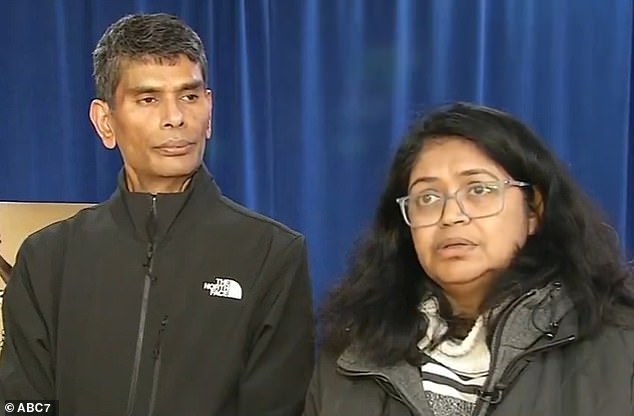
Balaji's parents have three main reasons they believe he couldn't have killed himself - the crime scene, the timing of his death after going public, and that he had too much to life for
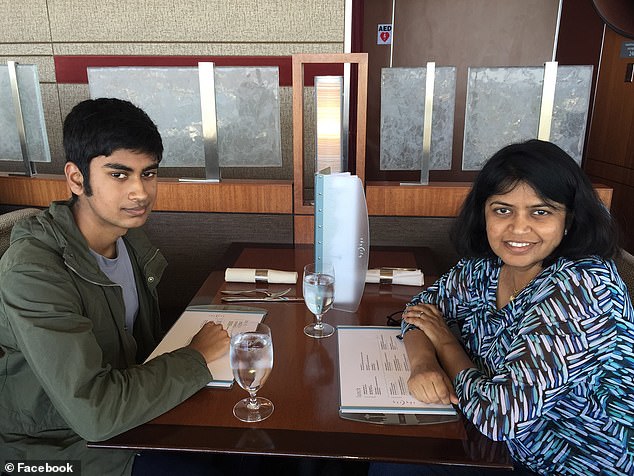
A second autopsy was done in early December at the cost of thousands of dollars, and Ramarao insisted it called the suicide explanation into question
Ramarao is on the phone or in meetings all day, talking to investigators, lawyers, and supporters to bring attention to her cause.
'We have depleted all of our saving in the fight for justice,' she wrote on a fundraiser, citing legal fees of $1,000 to $1,500 an hour and $500 to $800 an hour for private investigators.
Ramarao in other interviews has heavily implied, and at least once outright named, who she thinks had her son killed - but now takes a more guarded line.
'We don't know who it is, unless we do the investigation we won't know,' she said.
'If we ask, generally, who would have benefited from this, we know. We can pinpoint and say, "yeah, this person could be benefited" - but unless proven, not guilty.'
But both she and Ramamurthy feel the stress of speaking out, as their son did, and worry they could be next. They no longer go out anywhere alone.
'That's what people are telling us, you're already being watched and your life may be at risk, be cautious,' Ramarao said.
'We know our enemy is very, very powerful.'
No matter how painful it was to lose him, Ramarao said she remained proud of her son for his courage in sticking to his principles.
'I am not grieving, I have become numb… I don't know how I could have saved my son by teaching him to tell lies,' she said at his vigil.
'The ethics with which I raised him took his life today.'
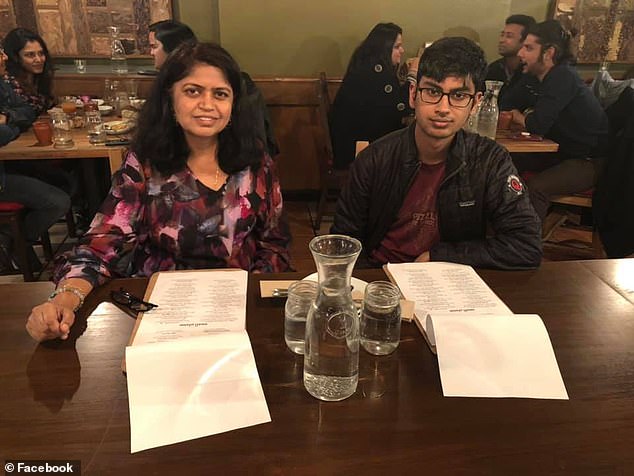
No matter how painful it was to lose him, Ramarao said she remained proud of her son for his courage in sticking to his principles
Balaji's death takes on a life of its own
Conspiracy theories about Balaji's death started almost immediately after it became public in news reports on December 13.
Social media provocateurs and true crime buffs quickly began sharing and debating the story, declaring that the AI industry had him killed.
His family first posted online about it on December 14, writing 'we are seeking to know complete truth, we need more answers', adding fuel to the fire.
An alliance of crypto fans, right-wing pundits, influencers, fringe 'journalists', and outright conspiracy theorists has kept the chatter raging for six weeks.
The online avalanche reached sufficient intensity that it reached the attention of Altman's arch-nemesis Elon Musk.
'This doesn't seem like a suicide,' he wrote when reposting one of Ramarao's tweets, and also shared other articles and posts about the case with comments like 'hmm' and 'concerning'.
Musk has a longstanding feud with OpenAI and Altman and battled them since they refused his offer to buy them out in 2018.
He has since slammed OpenAI for accepting $90 billion of funding, and its plans to transition to a for-profit company, arguing the commercial enterprise flies in the face of its original mission - to help fight threats to humanity posed by AI.
It was inevitable Musk would get involved in Balaji's case, not only due to his animosity towards Altman and OpenAI, but because many of those sharing it had one thing in common.
Even before he got involved, many of the extremely online proponents were avowed fans of the Tesla billionaire and shared his distrust of Altman.


'This doesn't seem like a suicide,' Elon Musk, arch-nemesis of Sam Altman, wrote when reposting one of Ramarao's tweets, and also shared other articles and posts about the case
Some saw the tragedy as an opportunity to enrich themselves, either by sharing it to increase their clout, making shareable video content, or in one case making millions off a memecoin shamelessly exploiting Balaji's death.
Others have more genuine motives, like Fremont, California, real estate agent Girish Bangalore, who started a petition demanding a 'comprehensive investigation'.
The San Francisco Police Department said Balaji's death was still an 'active and open investigation' and declined to share the full incident report.
OpenAI said it was 'devastated' after his death was made public and was in touch with his family to offer support
'Our priority is to continue to do everything we can to assist them,' it said.
'We first became aware of his concerns when The New York Times published his comments and we have no record of any further interaction with him.
'We respect his, and others', right to share views freely. Our hearts go out to Suchir's loved ones, and we extend our deepest condolences to all who are mourning his loss.
'Suchir was a valued member of our team and we are still heartbroken by his passing. We continue to feel his loss deeply.
'We've reached out to the San Francisco Police Department and have offered our assistance if it's needed.
'Law enforcement are the right authorities in this situation, and we trust them to continue sharing updates as needed.
'Out of respect, we won't be commenting further.'








































































































































































































































































































































































